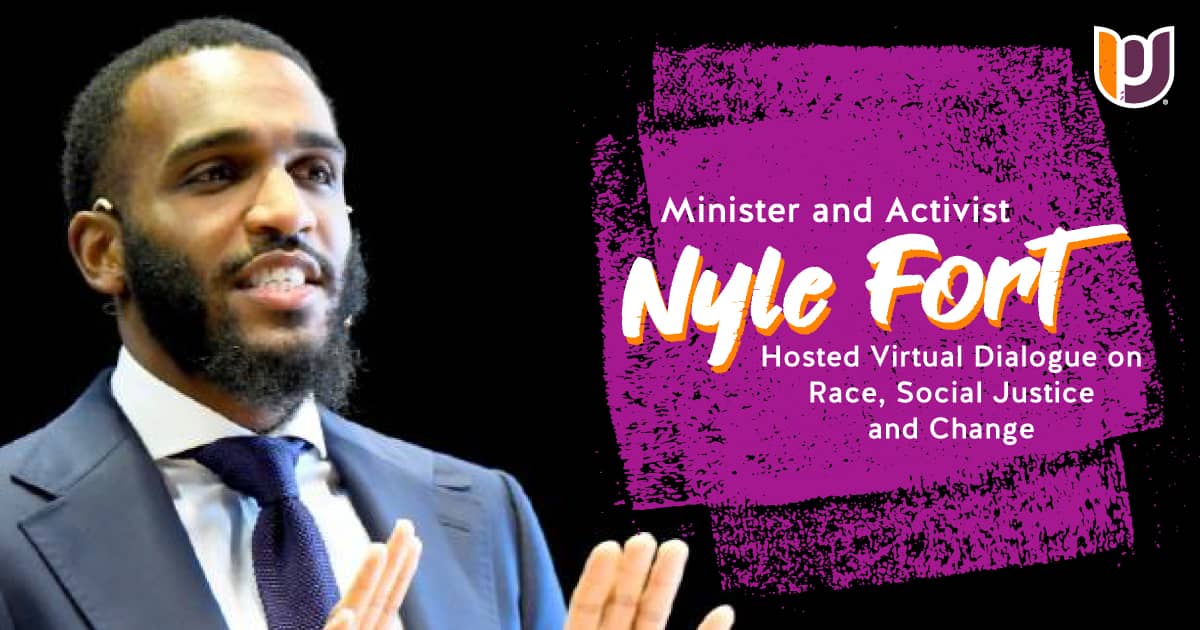By Katie Shpak, University Writer
“Today’s conversation is like a buffet,” says Minister and Activist Nyle Fort. “I’m going to put some food out on the table. You all are with me, and you’re going to put food on the table too. There may be food you don’t like, food you’ve never tried. What I ask, despite our different tastes and familiarity with foods, is that we find a way to sit at the same table and eat, together.”
Fort hosted a virtual dialogue with students at Post University on August 20, 2020. The dialogue revolved around race, social justice, and change. He spoke of the COVID-19 pandemic and the effect it has had on the lives of millions. He spoke of police brutality and racial prejudices. For the first half of the dialogue, Fort shared his perspectives and experiences regarding these topics and then opened up the remainder of the forum for discussion.
Growing up in a black funeral home with a mother who is a mortician, Fort was always very close to death. However, he expresses that nothing can quite compare to the experiences his mother has had to face during this pandemic.
“My mother was receiving over 200 calls a day at one point. And she would call back every single person and family before the day was over,” said Fort.
He voiced that African Americans are three times more likely to attract the coronavirus and two times more likely to die from it. Fort shared a personal experience that his mom had to undergo a few months ago with a black woman who lost her daughter to the coronavirus.
“A woman runs to the door of the funeral home. Now, the doors to the funeral home were glass doors, so you can see inside and outside. She started banging on the door, which was locked due to COVID restrictions. There was a sign on the door with a number to call, but the woman just kept banging on the door. She was begging, ‘please let me see my daughter. Please let me see my daughter.’ My mom starts walking up to the door and saw this woman pleading. She mouthed, ‘I am so sorry,’ because she knows she can’t open that door. When the woman sees my mom saying she can’t open the door, this woman starts crying. Like a baby. Weeping. Her daughter was twenty something years old. This woman not only lost her daughter but cannot see our touch her because of COVID restrictions.”
Fort continues to share how his mother and this woman had their hands up to each side of the glass, crying together. Fort lost a brother three years ago, so his mother knew what it felt like to lose a child, and she felt so hopeless not being able to even allow this mother inside to say goodbye to her daughter for the last time.
Despite the despondency and heartbreak, Fort shares, “I’m a preacher, which means even in the worst situations, I find some good news. We have to go through some nightmares to get to the dream Dr. King talked about. I offer that story to contextualize the numbers. We are in this grief thing together. We are in this pandemic thing together.”
Throughout this pandemic, Fort expresses that numbers have been constantly thrown in our faces. The number of cases. The number of lives taken. “I had to stop looking at the numbers,” said Fort. “People are not numbers. People are precious. People have dreams. They have names. They have family members. They have secrets. This all gets lost in the numbers.”
Since Fort grew up in a funeral home, he learned a lot about race in America. As he got older and began earning his PhD, he started writing about African American mourning.
“I was always mesmerized by the way we would laugh and shout and cry and weep all at the same time. I was mesmerized by these moments where you’d think we should be very solemn, but we were having celebrations of life. I wondered what it is about us that even in the face on death, we always refuse to give death the last word,” said Fort.
He then goes on to discuss the impact of police violence and the lives that are cut short as a result of police and racial vigilantes. “There are few places I feel safe,” says Fort. “Police killings are just the tip of the iceberg. There’s arrest, harassment, intimidation, fines and fees, and surveillance of black people and people of color daily.”
However, despite the adversities that Fort has experienced within his own life and those that surround us regularly, in addition to those that have transpired during the pandemic, he stands by his belief – “Even in the midst of the worst situations, I still believe there is good.”
